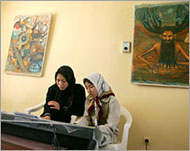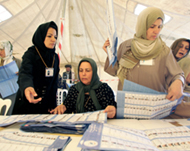Music school a first for Afghan ladies
Afghanistan has opened its first women-only music school.

Just a few years ago music was banned by the Taliban government and musicians fled the country.
Now, this six-month-old project at the Nagashand Fine Art Gallery in Mazar-i-Sharif, near the border with Uzbekistan, is teaching 18 girls and women to become music teachers.
The women are taught singing and how to play modern and traditional instruments.
Zahra Amiri, 14, the youngest student, says: “As a child, I liked music – I wanted to prove women can play music. I want to be a musician some day.”
Her sister, Masoma Mazari,25, heads the project and, like Amiri, is learning the electric keyboard.
Cultural taboos
But the $9,200 project, backed by the United Nations and local aid groups, still battles to overcome old fears.
“Music has had a very bad history in Afghanistan, so many people are against it,” Amiri said.
 |
|
Students are all former refugees, |
“Some families are afraid their girls will turn bad,” she said.
“But music is necessary for our soul. It calms our soul.”
All the students, ranging in age from 14 to 30, lived in Iran as refugees after their families left Afghanistan.
Afghan women who stayed during the civil war and the Taliban time are still reluctant to join.
“All the girls here are from Iran – they have grown up in a free environment,” Mazari said.
The only student who remained in Afghanistan during the Taliban’s rule quit after a few weeks due to social pressures in a conservative society.
She had appeared on television in a song contest in Kabul, coming third, but was harassed in Mazar when she returned.
“People here made fun of her. Now she is afraid to come to lessons any more,” said Amiri.
Changes
The influence of returning refugees has started to bring about change.
Women now sit in parliament, head government ministries and some are finding jobs outside traditional occupations. But even in major cities, many are still subject to tradition.
 |
|
Women are now holding |
Amiri and Mazari had never seen Afghanistan until they returned two years ago to Mazar-i-Sharif, a dusty city on the hot northern plains known for its hashish, carpets and Hazrat Ali mosque.
Their family, including Mazari’s husband, is supportive of their music.
But Mazari says it is too soon to allow boys to join.
“It would create problems if boys and girls study together,” she said.
“Some women have been separate for so long during the fighting it is very difficult for them to come study with males.”
Male teachers
The two teachers, however, are men. One, Khalil Bakhtari, 45, fled to the United Arab Emirates after the Taliban took power in 1996.
“I was very depressed when the Taliban came, because we could not teach music,” he said.
“If the Taliban knew I was a musician, they would have punished me.
“We wanted the Taliban defeated so that we could teach music again,” he said.
Bakhtari and his colleague, Nadair Kharimi, 33, teach about 10 instruments, ranging from the saxophone and electric keyboard to tabla drums and the ancient Afghani robab guitar.
A teacher for 15 years, Bakhtari said he was frequently asked by local women to set up a music school after his return.
But he never had the resources – his harmoniums, for example, cost $300 each in a country where the average annual income is about $200.